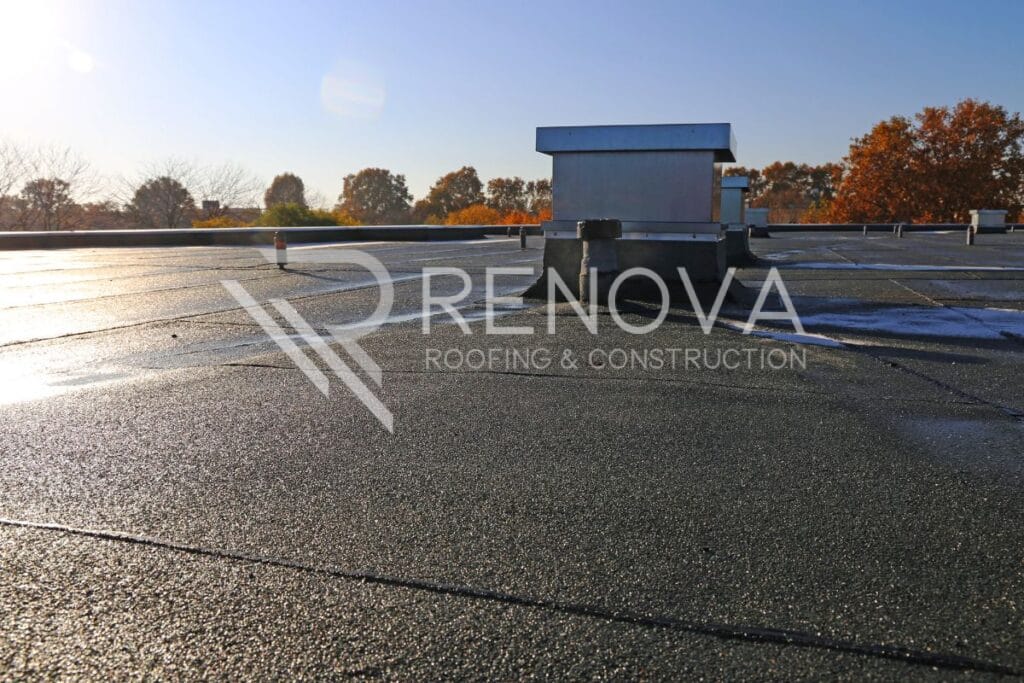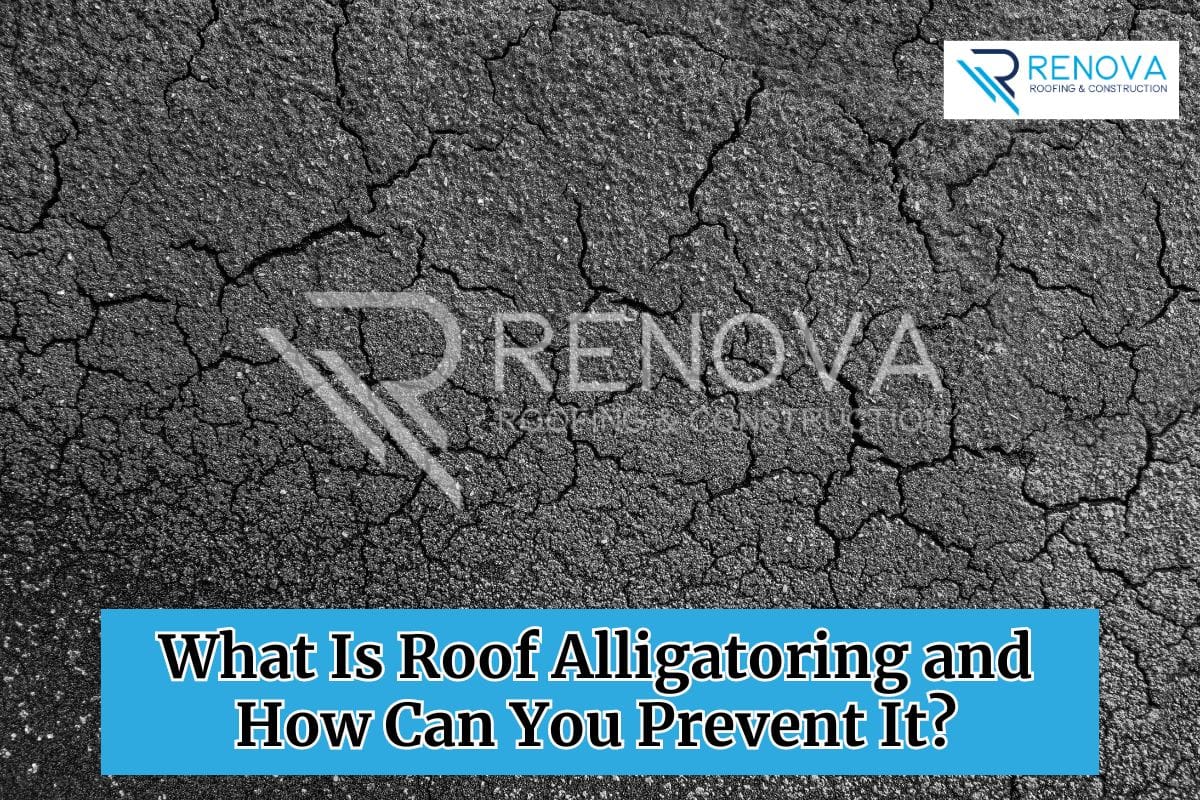Your roof serves as your building’s primary defense against harsh weather, protecting your business from rain, snow, wind, and sun while ensuring your employee’s comfort and safety. However, like any other part of a building, roofs can experience wear and tear.
One common issue, particularly with flat roofs, is alligatoring. If your roof appears cracked and exhibits a scaly pattern reminiscent of an alligator’s back, you may be facing this problem.
In this blog post, we’ll explore the causes, symptoms, dangers, prevention, and repair options related to roof alligatoring.
What Is Alligatoring On A Roof?
The term roof alligatoring describes a pattern of cracks on flat roofs that resemble an alligator’s skin. This issue usually manifests when a roof ages, mainly as a result of extended exposure to the sun’s ultraviolet (UV) rays. These UV rays cause the roof’s protective membrane or coating to dry out over time, which causes cracks. These cracks may worsen with time, particularly if they are not addressed.
Signs of Alligatoring on a Flat Roof
Watch for these clear signs that your roof might be alligatoring:
1. Cracking Pattern
The main sign of alligatoring is deep, connected roof cracks, resembling alligator skin. These cracks may start small but can grow over time, weakening the roof’s waterproofing and leading to potential failure.
2. Aging Roof
Alligatoring often occurs on older roofs, especially those exposed to tough weather. As roofing materials age, UV rays and temperature changes speed up the deterioration, causing cracks to form.
3. Dry Surface
A dry, brittle roof surface is another sign. UV rays eventually break down the roof’s protective layer, making it less flexible and more likely to crack. Regular maintenance can catch this early and prevent further damage.
4. Water Leaks
Cracks from alligatoring can let water seep through, leading to leaks inside the building. This can harm the roof structure and cause interior water damage if not fixed early.
5. Higher Energy Costs
Damaged roofs from alligatoring can lead to higher energy bills, as they become less efficient at keeping indoor temperatures stable. Fixing these issues can help reduce energy use and save money.
What Are Some Common Causes of Roof Alligatoring?
To avoid roof alligatoring, it is important that you first understand the common factors that cause it.
1. Aging of Roof Materials
As flat roofs age, their materials wear out. Protective layers can lose strength, making the roof less flexible and more brittle. This increases the risk of cracks and alligatoring.
2. Sun Exposure
Constant sunlight can dry out roof materials. UV rays take away moisture and flexibility, leading to small cracks that can grow larger over time, causing serious damage if not repaired quickly.
3. Temperature Changes
Roofs expand and contract with temperature changes. This movement stresses the materials, causing roof cracks. Combined with aging and sun exposure, this stress can speed up alligatoring and weaken the roof.
4. Poor Installation Practices
Incorrect roof installation can lead to alligatoring. Installing a roof in bad weather or using the wrong techniques can prevent it from sticking properly, causing early wear and damage.
5. Trapped Moisture
Water that pools on the roof due to poor drainage can cause problems. Trapped water can seep into cracks and worsen damage. It can freeze and thaw with temperature changes, making roof cracks bigger and promoting alligatoring.
6. Debris Accumulation
Leaves and twigs trap moisture and block gutters, resulting in rot and damage. Keeping the roof clear through regular cleaning is essential for its health.
How to Prevent Roof Alligatoring

For flat roofs, particularly in commercial structures, roof alligatoring is a frequent issue. To stop alligatoring, try these simple measures:
#1. Schedule Regular Inspections
Get your roof inspected at least twice a year. A professional can spot early signs of alligatoring. Catching small issues early can save money on bigger repairs later. Regular checks help extend your roof’s life and keep it in good shape.
#2. Keep the Roof Clean
A clean roof is vital for preventing alligatoring. Remove debris like leaves and dirt, which can trap moisture and promote mold. Keeping the roof clear reduces water pooling and helps protect the roofing material. A clean surface also helps any protective coatings stick better.
#3. Use Protective Coatings
Applying UV protectants or reflective coatings can protect your roof from harmful sun exposure. These coatings reflect sunlight and minimize temperature changes that can cause cracking. Regularly using these coatings can help your roof last longer.
#4. Address Moisture Issues Quickly
Manage moisture carefully to prevent alligatoring. Fix any leaks or standing water right away to avoid worsening damage. Water can lead to more cracks and even mold growth.
#5. Choose Quality Roofing Materials
Investing in high-quality roofing materials is important. Better materials resist UV rays and environmental stress, reducing maintenance needs. Choosing durable materials from the start can enhance your roof’s durability.
#6. Monitor Temperature Changes
Temperature changes can affect flat roofs significantly. Keeping an eye on these changes can help you understand their impact on your roof. Adding insulation inside the building can stabilize temperatures, reducing stress on the roof.
#7. Hire Professional Roofing Services
Hiring professionals for inspections and maintenance is essential. They can spot issues that might be missed otherwise and recommend the right solutions. Regular professional care ensures that your roof stays in top condition and protects your investment.
Dangers of Ignoring Alligatoring
Ignoring alligatoring can be a costly mistake, leading to many problems for your commercial property.
#1. Structural Damage
Alligatoring weakens roofs, leading to water leaks or further breakdown. If left unchecked, it may require expensive repairs or even full replacement.
#2. Higher Repair Costs
Delaying repairs worsens damage, making them more costly. Minor roof cracks can turn into major issues that demand bigger fixes.
#3. Shortened Roof Lifespan
Alligatoring weakens the roof, reducing its effectiveness and causing it to wear out faster, leading to earlier replacement.
#4. Water Leaks
Cracks let water seep into your home, damaging walls, ceilings, and insulation, which can lead to higher repair costs.
#5. Mold and Mildew
Moisture from leaks can promote mold growth, posing health risks such as respiratory problems.
#6. Unsightly Appearance
Cracked surfaces from alligatoring can make buildings look unattractive, hurting the property’s curb appeal.
Repairing Roof Alligatoring
When you notice alligatoring on your roof, it’s important to address it quickly to avoid more damage.
1. Minor Repairs
For small, localized alligatoring, minor fixes can be made using sealants or patching compounds.
- Cleaning: Clear any dirt or debris to ensure good adhesion.
- Sealant Application: Use roofing sealant or patching compound to fill cracks. This is a short-term fix and may not work for large-scale damage.
2. Roof Coating
A roof coating can seal and protect the entire roof.
- Surface Prep: Clean the roof and apply a primer.
- Coating: Once prepped, apply a roof coating to extend the roof’s lifespan. While helpful, this is a temporary fix and may require reapplication.
3. Full Roof Replacement
For widespread alligatoring, a full replacement is often necessary. Additionally, if the roof is old, replacement ensures long-term protection and keeps property value intact.
- Contact a Roofing Contractor: Research local roofing companies and find one that specializes in commercial roof replacement.
- Schedule an Inspection: A professional will assess the condition of your roof and determine the best way forward.
Need Help with Roof Alligatoring? Contact Renova Roofing & Construction Today!
Alligatoring is a common issue for flat roofs that needs prompt attention. Consult roofing professionals for advice and solutions tailored to your roof. Don’t let small problems worsen—proactive care will keep your roof in good shape for years.
When it comes to protecting your commercial property, trust Renova Roofing & Construction. We specialize in high-quality commercial roofing services, and our skilled team is committed to providing excellent workmanship and customer satisfaction. Don’t let roof alligatoring or other issues threaten your business. Contact Renova Roofing & Construction today at (601) 647-3433 for a consultation, and let us protect your investment.

